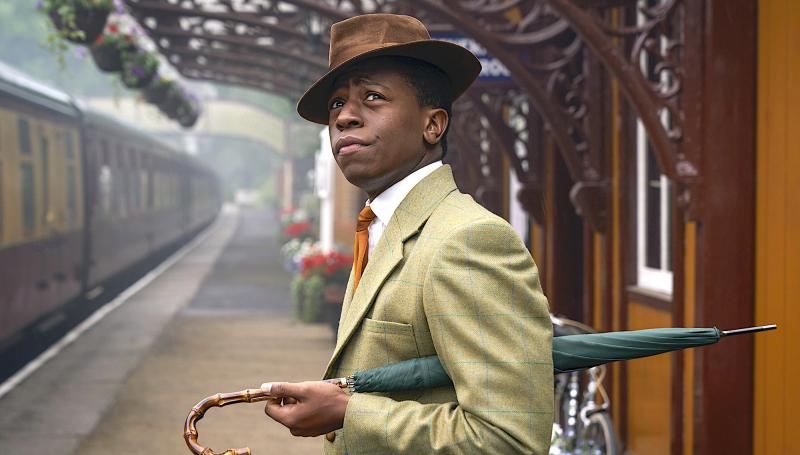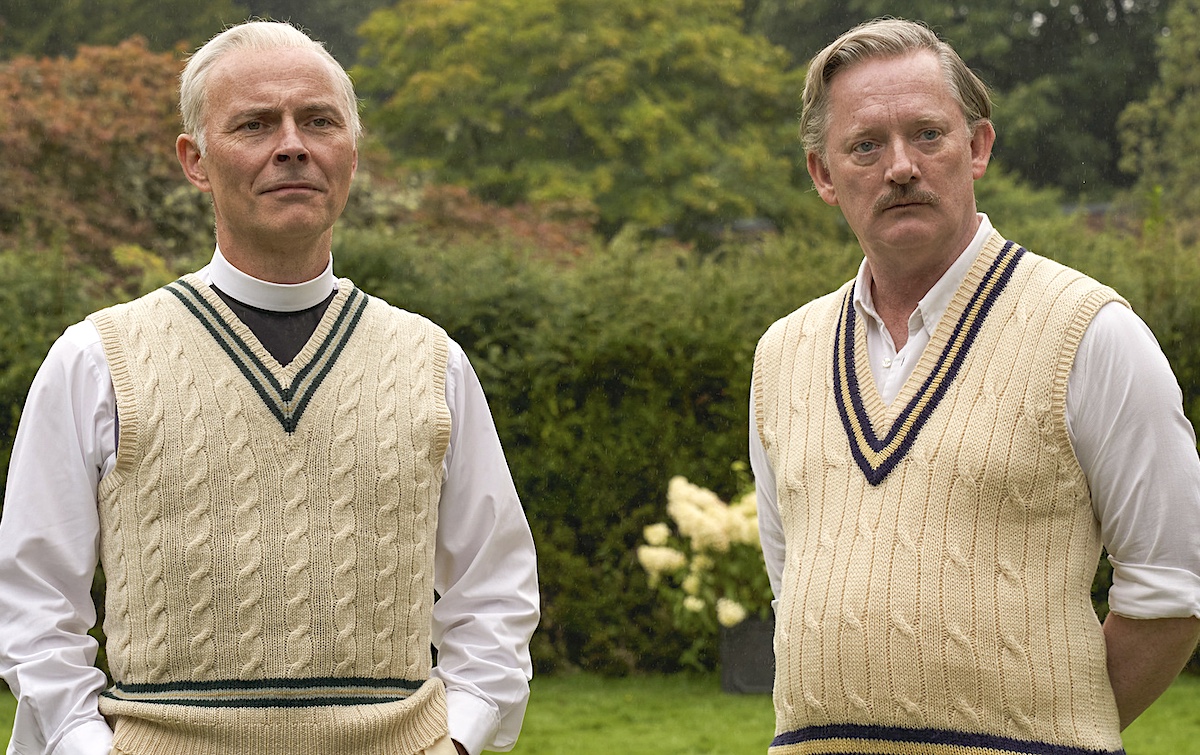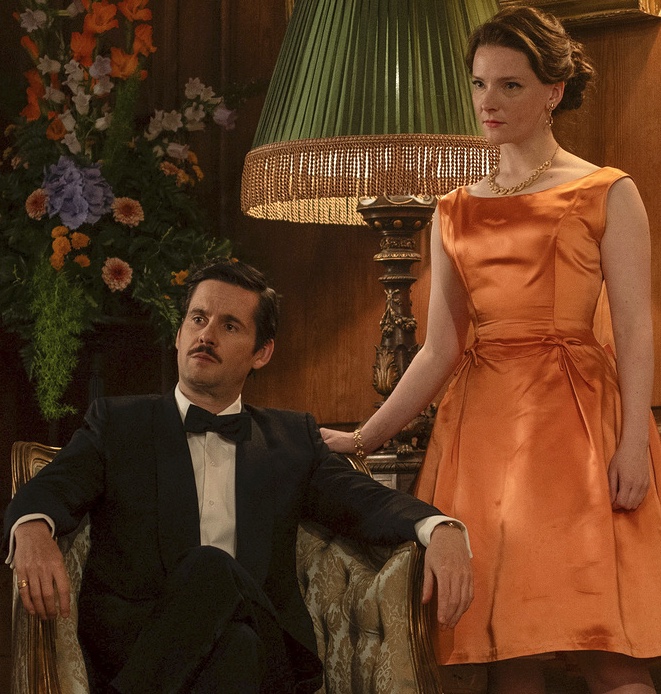Murder Is Easy, BBC One review - was this journey really necessary? | reviews, news & interviews
Murder Is Easy, BBC One review - was this journey really necessary?
Murder Is Easy, BBC One review - was this journey really necessary?
Dame Agatha's tidy thriller gets ideas above its station

Well at least they haven’t changed the identity of the killer this time around, but the BBC’s new version of Agatha Christie’s 1939 novel has been modified in other ways. Screenwriter Siân Ejiwunmi-Le Berre and director Meenu Gaur have opted to move the story into the mid-1950s, introducing themes of racism, class prejudice and capitalist exploitation.
Labouring under this narrative burden is the protagonist Luke Fitzwilliam, who Christie wrote as a retired colonial policeman. Here, he’s reborn as a regional attache from Nigeria who’s following his boss to London to take up a new job at the Colonial Office in Whitehall. He’s played by David Jonsson (recently seen in the rom-com Rye Lane) with a kind of insouciant charm and unimpeachable dress sense.
But Fitzwilliam’s trip to Whitehall is derailed by a chance encounter on a train with Miss Lavinia Pinkerton (the indefatigable Penelope Wilton, surely the greatest Miss Marple unfilmed). She regales him with a story of how two, and possibly three, people have been murdered in her home village of Wychwood under Ashe. She’s pretty sure there’s more to come, too. “Murder is easy for a certain type of person,” she avers.
 Poor Lavinia herself doesn’t last long, since she’s felled by a hit-and-run driver outside Waterloo station, but Fitzwilliam’s appetite is whetted. Soon, he’s found himself lodgings in Wychwood… though not before he’s paid a visit to a West African Dance Centre and been harangued for collaborating with the colonialist oppressors.
Poor Lavinia herself doesn’t last long, since she’s felled by a hit-and-run driver outside Waterloo station, but Fitzwilliam’s appetite is whetted. Soon, he’s found himself lodgings in Wychwood… though not before he’s paid a visit to a West African Dance Centre and been harangued for collaborating with the colonialist oppressors.
Since, in this telling, he isn’t a policeman, it feels a little odd that he’s soon poking and prodding around looking for clues, though naturally there’s plenty for him to be suspicious about. For instance, everyone seems to hate the supercilious Lord Whitfield (Tom Riley), ensconced in the local mansion. Judging from snarky comments by the Reverend Humbleby (Mark Bonnar, pictured above with Douglas Henshall), Whitfield is a wartime profiteer, using his ill-gotten loot to build a whole new town named after himself. Why, rages the Reverend, isn’t he building “some decent, affordable homes?” The ignoble Lord looks all set to marry the winsome Bridget Conway (Morfydd Clark, pictured below with Riley), though she does come on a bit flirty with Fitzwilliam.
Meanwhile bodies are piling up in mounds, and it’s not unusual for a conversation to be interrupted by a muffled nearby scream, announcing the latest fatality. The local cops seem to act as Lord Whitfield’s private bodyguards, and never do any actual police work.
 There’s a comical lightbulb moment when Fitzwilliam says “we need to find a connection between the victims!” and Bridget suddenly remembers that they all come from the squalid Ashbottom district (“sort of the other side of the tracks”). Soon, Fitz is quaffing a pint and choking on his pork scratchings in an Ashbottom pub, while the locals vent their class-warfare spleen. Lord Whitfield “climbed the greasy pole to respectability and pulled the ladder up behind him”, while village sawbones Dr Thomas has “only got time for his private patients. Nothing but linctus for us.”
There’s a comical lightbulb moment when Fitzwilliam says “we need to find a connection between the victims!” and Bridget suddenly remembers that they all come from the squalid Ashbottom district (“sort of the other side of the tracks”). Soon, Fitz is quaffing a pint and choking on his pork scratchings in an Ashbottom pub, while the locals vent their class-warfare spleen. Lord Whitfield “climbed the greasy pole to respectability and pulled the ladder up behind him”, while village sawbones Dr Thomas has “only got time for his private patients. Nothing but linctus for us.”
Soon, Fitzwilliam will learn that Dr Thomas (Mathew Baynton) harbours theories about racial purity and the “judicious elimination” of social undesirables that would make Heinrich Himmler look like Justin Welby, and the case starts to look like a slam-dunk. Ha!
Snag is, the added political baggage slackens the focus on the basic plot, and the characters become one-dimensional signifiers of an attitude rather than rounded individuals. A case in point is Major Horton (Douglas Henshall, who needs to sort himself out and get back to Shetland), who huffs and puffs as if he’s in an Ealing comedy. He gets to deliver an anti-imperialist broadside of majestic unsubtlety – he’s sick of “bully-boys in uniform,” and “that’s why Lydia and I got out of the whole dirty game – empire.”
Somewhere in here they’ve hidden a perfectly agreeable murder mystery, even if it isn’t Dame Agatha’s finest. But was this journey really necessary?
- Part 2 of Murder Is Easy is on BBC One on 28 December and both episodes are available on BBC iPlayer
Add comment
The future of Arts Journalism
You can stop theartsdesk.com closing!
We urgently need financing to survive. Our fundraising drive has thus far raised £49,000 but we need to reach £100,000 or we will be forced to close. Please contribute here: https://gofund.me/c3f6033d
And if you can forward this information to anyone who might assist, we’d be grateful.

Subscribe to theartsdesk.com
Thank you for continuing to read our work on theartsdesk.com. For unlimited access to every article in its entirety, including our archive of more than 15,000 pieces, we're asking for £5 per month or £40 per year. We feel it's a very good deal, and hope you do too.
To take a subscription now simply click here.
And if you're looking for that extra gift for a friend or family member, why not treat them to a theartsdesk.com gift subscription?
more TV
 Murder Before Evensong, Acorn TV review - death comes to the picturesque village of Champton
The Rev Richard Coles's sleuthing cleric hits the screen
Murder Before Evensong, Acorn TV review - death comes to the picturesque village of Champton
The Rev Richard Coles's sleuthing cleric hits the screen
 Black Rabbit, Netflix review - grime and punishment in New York City
Jude Law and Jason Bateman tread the thin line between love and hate
Black Rabbit, Netflix review - grime and punishment in New York City
Jude Law and Jason Bateman tread the thin line between love and hate
 The Hack, ITV review - plodding anatomy of twin UK scandals
Jack Thorne's skill can't disguise the bagginess of his double-headed material
The Hack, ITV review - plodding anatomy of twin UK scandals
Jack Thorne's skill can't disguise the bagginess of his double-headed material
 Slow Horses, Series 5, Apple TV+ review - terror, trauma and impeccable comic timing
Jackson Lamb's band of MI5 misfits continues to fascinate and amuse
Slow Horses, Series 5, Apple TV+ review - terror, trauma and impeccable comic timing
Jackson Lamb's band of MI5 misfits continues to fascinate and amuse
 Coldwater, ITV1 review - horror and black comedy in the Highlands
Superb cast lights up David Ireland's cunning thriller
Coldwater, ITV1 review - horror and black comedy in the Highlands
Superb cast lights up David Ireland's cunning thriller
 Blu-ray: The Sweeney - Series One
Influential and entertaining 1970s police drama, handsomely restored
Blu-ray: The Sweeney - Series One
Influential and entertaining 1970s police drama, handsomely restored
 I Fought the Law, ITVX review - how an 800-year-old law was challenged and changed
Sheridan Smith's raw performance dominates ITV's new docudrama about injustice
I Fought the Law, ITVX review - how an 800-year-old law was challenged and changed
Sheridan Smith's raw performance dominates ITV's new docudrama about injustice
 The Paper, Sky Max review - a spinoff of the US Office worth waiting 20 years for
Perfectly judged recycling of the original's key elements, with a star turn at its heart
The Paper, Sky Max review - a spinoff of the US Office worth waiting 20 years for
Perfectly judged recycling of the original's key elements, with a star turn at its heart
 The Guest, BBC One review - be careful what you wish for
A terrific Eve Myles stars in addictive Welsh mystery
The Guest, BBC One review - be careful what you wish for
A terrific Eve Myles stars in addictive Welsh mystery
 theartsdesk Q&A: Suranne Jones on 'Hostage', power pants and politics
The star and producer talks about taking on the role of Prime Minister, wearing high heels and living in the public eye
theartsdesk Q&A: Suranne Jones on 'Hostage', power pants and politics
The star and producer talks about taking on the role of Prime Minister, wearing high heels and living in the public eye
 King & Conqueror, BBC One review - not many kicks in 1066
Turgid medieval drama leaves viewers in the dark
King & Conqueror, BBC One review - not many kicks in 1066
Turgid medieval drama leaves viewers in the dark
 Hostage, Netflix review - entente not-too-cordiale
Suranne Jones and Julie Delpy cross swords in confused political drama
Hostage, Netflix review - entente not-too-cordiale
Suranne Jones and Julie Delpy cross swords in confused political drama

Comments
The biggest load of rubbish I
The biggest load of rubbish I've ever seen. Why must we mess with the original just to make a point of something that happened in the rich history of our past. I'm so fed up with all this wokeness.
We really wonder why they don
We really wonder why they don't write their own original stories and instead of recycling perfectly good stories from Agatha Christie.This instance of "Murder is Easy" is just boring, it's just a succession of vignette. However I have to say Fitzwilliam character is really dapper and the collection of suits is well put together.
Absolutely true, as dull as
Absolutely true, as dull as watching paint dry. Can you believe there's people defending how poor it is by calling people bigots and racists if you didn't enjoy it! Hypocrites.....
Pork scratchings were not
Pork scratchings were not available in the 1950's also in one scene in the village pub the clock showed ten past four, the pubs were closed at that time of the day , all day opening did not start until 1988!
Nice detective work, Anthony.
Nice detective work, Anthony. I think pork scratchings had existed for quite a while, but weren't mass produced until the 1960s. More info here: https://hairybarsnacks.com/the-history-of-pork-scratchings/
I was also curious about how our hero, Mr Fitzwilliam, got on a train in Liverpool and got off at Waterloo. But before Dr Beeching's axe, perhaps anything was possible...